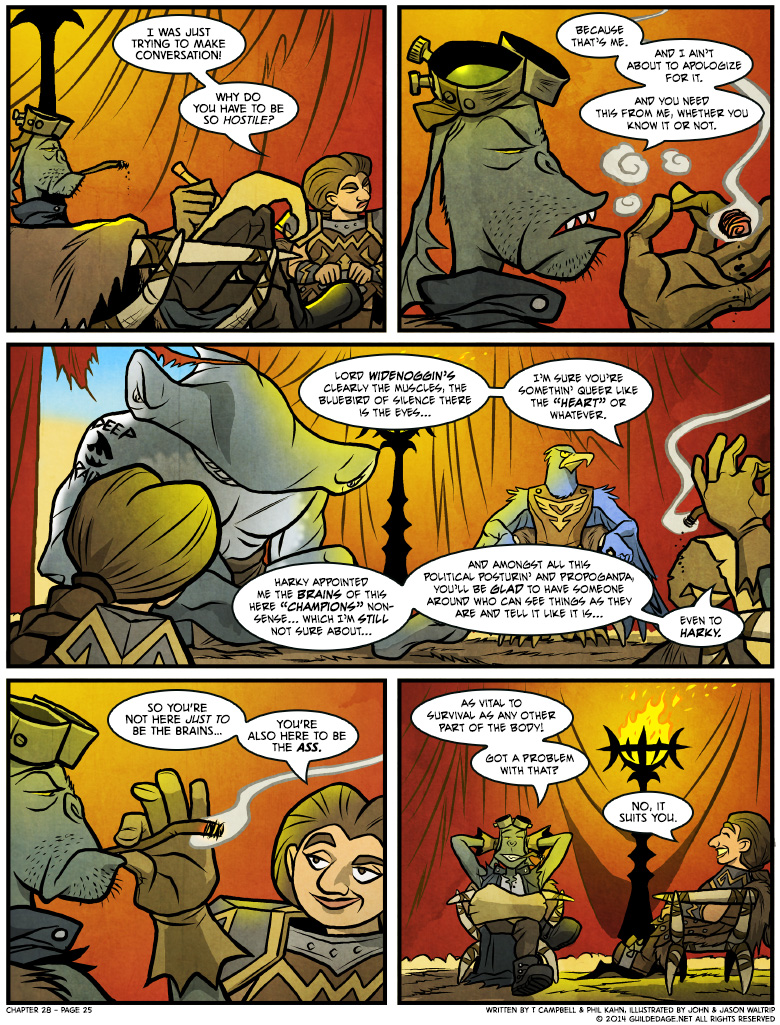Annotated 28-25
 I’m honestly so proud of Magda here.
I’m honestly so proud of Magda here.
Goblaurence may be all “I ain’t apologizing for shit,” but he immediately follows that up with a long explanation that’s partly about declaring his (tentative) loyalty to the group, and what he feels he can bring to it. Someone else might’ve focused on the arrogance that laces his speech, but this is one time when looking for the best in people works in Magda’s favor. In response, she tries speaking a little of his language, and he instantly becomes more comfortable.
Like many conflicts in Guilded Age between people who should ultimately be on the same side, this clash probably had its roots in my clashes with Phil. I’m a genteel and somewhat sheltered Southerner who cares a lot about manners; Phil, as he would say, is from Philly. Figuring out when and when not to take offense was an ongoing struggle in our relationship, and we both had to work a bit to match each other’s frequencies.











As a Southerner myself, and possibly on the spectrum, it can be intensely frustrating to navigate social engagements. It’s always a relief when the walls come down a bit, even if that means being crude. Even crude for crude’s sake, among my friends.
Whereas some people just say what they mean, and that’s, just, alien. I don’t know if it’s a Northern thing, but it’s certainly something. It throws me off and yet is ingratiating in a way.
As a West Coast native who is probably also on the spectrum, I do generally say what I mean when I open my mouth.
Taboos, particularly of the social variety, are on par with superstitions, in my book; they’ll bite you in the rear just as hard as you believe they will. And if you don’t believe in them, you probably don’t earnestly believe in whatever group has been reinforcing them – so nothing short of mutilation, blackmail, or criminal sabotage that either one of them can do to you is ultimately real harm, if you choose to have no faith in their utility.
If that attitude gets me disinvited from such a group, or puts me on their shit list, I’m probably better off for it – and that’s just how I live.
My own struggle in communicating (and not just with people from elsewhere) has instead largely been about balancing comprehensible phrasing with my intentionally dense doses of meaning – and with my communication style coming across as “arrogant”, or at least lacking in humility, in the eyes of some. (TBF, sometimes that’s the hat I chose to wear that day, but it’s very infrequently so.)
I have had difficulty in particular trying to deal with those whose esteem for authority figures is so great that, in their eyes, merely asking whether you really understand any of the insights their expertise produces, equates to a mortal sin… those types would never dare be so bold, and if even they can’t grasp that meaning, then how can you possibly think you’re that wise? (Yeah, I can’t stand these people… that’s not how you better yourself. That’s just how you kiss arse. Guess there’s people who climb social ladders that way, but they suck, so screw them.)
As you might imagine, it’s hard for me to be diplomatic with people that think I should, on principle, stifle my own intuition and opportunities for the sake of deference to those more privileged or otherwise “elite” than me.
I also was raised to communicate in what I have no better term for than “the masculine fashion”, originally, so I tend to habitually neglect to qualify what I say as being “my opinion” or my own speculation rather than fact – and have no compunctions against challenging expert opinion, whenever some apparent evidence illuminates them as being just as fallible as the rest of us on certain topics. So that can be an easy way in which I can be mistaken for arrogant, too.
And yeah, contrary to popular suspicion, holding a reasonably founded belief in defiance of expert opinion is not the same as saying you can do their job just as well. Experts are specialists in narrow fields, so their expertise can in certain cases simply be limited – and there’s no reason not to point it out when everyone else conveniently neglects that fact, and ignorantly chooses to defer to their status of authority for some self-flagellatingly-stupid reason.
Hooo… so, when I finished school, I didn’t care about customs or social conventions. I was trying to be nice and whatnot, but you would not get me to conform with anything I had decided was not to my liking. For example not get me in a suit and tie, not matter the occasion. And when I didn’t like something, I’d simply declare how it was useless and stupid.
It took me about a decade to realize that anyone who’d have done the same thing to me would have been instantly classified an asshole by me.
By the time I got married, and had somebody who trusted me (and whom I trusted…), I had a much better grip on such things. But of course I wasn’t going to wear a tie for my wedding — I got a bow tie, and that’s what I’m wearing to weddings and such since then. I found a way to be very well dressed without wearing the uniform :)
And I also noticed that criticism goes down a lot better with some compliments. If I don’t understand why somebody is something which I didn’t think was a good idea, the conclusion is not that they’re stupid, but that I don’t understand what makes them do it. Tone is important, and just because I don’t _mean_ to insult somebody I can’t demand them to not interpret my words as insults although that’s what they sound like because as XKCD so nicely explains, the responsibility of avoiding misunderstandings cannot rest entirely with either party in a communication, therefore I need to adapt what I say and how I say it to the person I’m addressing. Very similar thing as with the dress code applies: I still don’t talk bullshit of the type I notice in other “career” people, or meaningless smalltalk, and I still cannot answer to “how are you?” without either explaining how I am or taking a breath, remembering the stupid convention, deciding the person probably doesn’t know any better, and replying “I’m alright, thanks, and you?” (or “not too bad”, but almost never “Fine, thanks!” unless I’m actually feeling really good that moment because damned if I’m gonna lie just to blend in with the neurotypicals).
So… dear Gob here is not actually that far from me 20 years ago. He still hasn’t learned the lesson that social conventions and courtesy have a very important function: They make it easier for people to avoid stepping on each others’ toes, and recognize each person’s part in avoiding accidentally making others miserable for no particular reason.
Actually, on that topic: https://xkcd.com/1911/
Philly people love to say they’re from Philly, as if it should immediately forgive their Philly-ness. It keeps them from being forced to be better people. (I kid a little here; TBH, a lot Philly people I know have a big heart, but it wrestles with the chip on their shoulders. OTOH, some of them are just assholes.)
That sounds like what little I know of ’em, indeed.
I’d be an ass too if I had a whole city named after me, man.